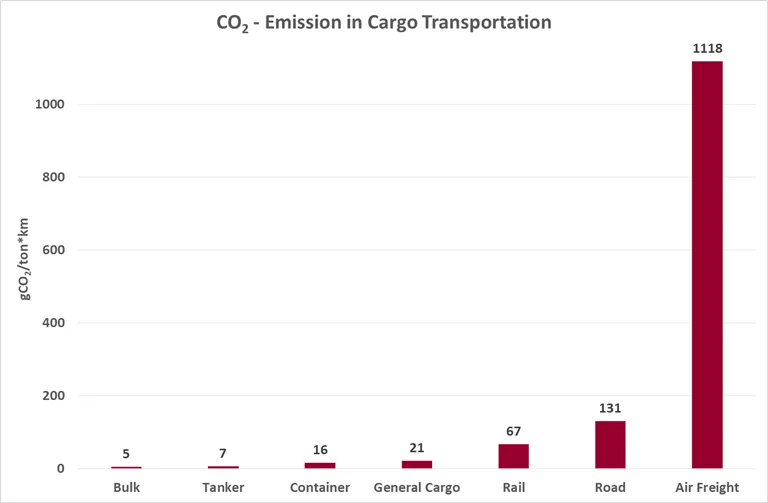Environmental responsibility is taken seriously by working systematically to improve performance. The implementation of ISO 14001 demonstrates this commitment and the company achieved system certification by Det Norske Veritas since November 2008. This system identifies environmental aspects, legal and other requirements, objectives, targets and programmes. It defines resources, roles, responsibility and authority for the company’s environmental processes. Using ISO 14001 provides assurance to company management, employees as well as external stakeholders, that environmental impact is being measured and continuously improved.
Strong expansion of the global shipping sector has taken place since World War II. In recent decades, increasingly stringent international environmental regulations are implemented in place for the shipping industry. However the environmental challenges of international shipping is still significant.
Air emission (g/mtkm) resulting from various means of transport is illustrated below. Shipping as a means of transporting goods remains an environment emission friendly form for transport and we are pleased to report that the emission trend for the JJUC fleet is also decreasing. A purpose-built database system for monitoring environmental performance for the individual vessels, the fleet as a whole and the main office facilities is in operation. With reference to the company managed fleet, fuel consumption resulting in lower emissions to air has been reported since 2009.
The Norwegian Shipowners’ Association (NSA) works systematically to reduce all harmful emissions to land, air and sea. As a member, JJUC support this initiative.

Source:
Norges Rederiforbund/
Norwegian Shipowners Assosiation
The modern globalised world is totally dependent on the transportation of goods between countries and continents. Without the international transport sector, world trade would stop entirely. JJUC is proud to be part of the world's maritime fleet providing one of the most environmentally friendly ways of transportation. This is due to the low fuel consumption per ton mile of transported goods as previously illustrated.
During 2015 a materiality analysis was performed resulting in three aspects requiring attention. One of the aspects was related to Environmental work. The company is today certified in accordance with the ISO 14001 standard, which gives guidance as to the environmental work constant with and in relation to the company’s CSR focus. (Elements that have been identified as material, needing further attention are; reporting from the vessels, new and focused environmental initiatives, and in addition environmental management/leadership.)slett? Environment is on the Management Review agenda and is subject to annual review and status evaluation of the old and new initiatives, and instigate new actions as deemed prudent to manage the material aspects.
UM Bulk AS is a 50/50 joint venture between the J.J. Ugland companies and Mitsubishi Corporation. Vessels owned by UM Bulk AS: MV Lunita, delivered in 2014, and MV Ellenita, a TESS-58 bulk carrier with eco-design and more effective engines with reduced fuel consumption, delivered in 2015. Two more vessels were delivered in 2017, MV Olita and MV Belita.
The same focus is present for the Ugland Shipping newbuilds as well as is compliance with new and coming environmental regulations such as ballast water treatment, SOx emission reduction through the IMO 2020 low sulfur regulation.
